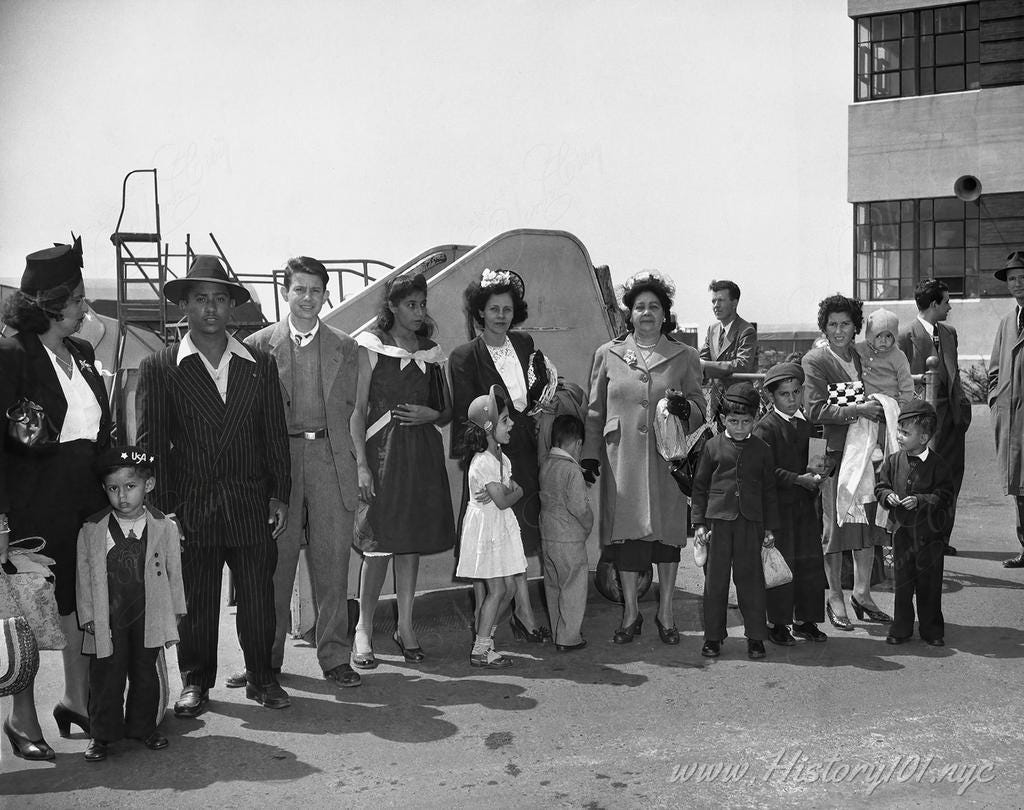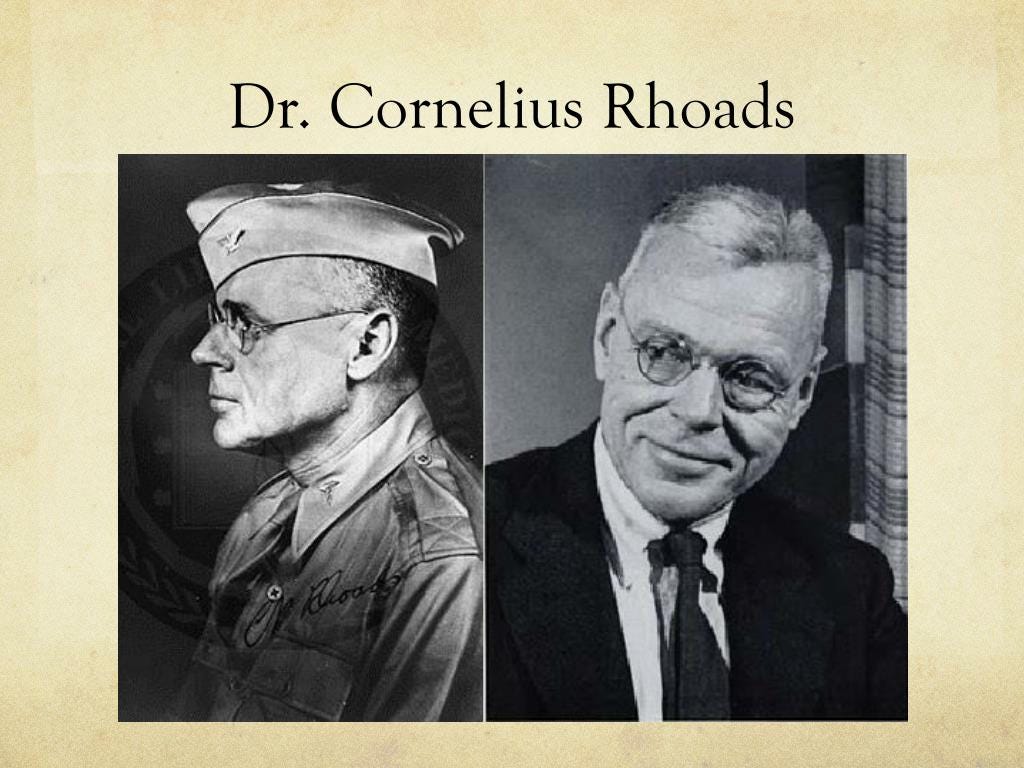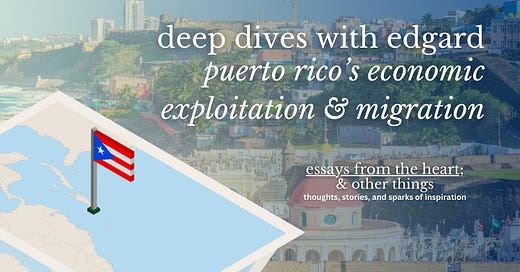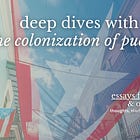deep dives with edgard: puerto rico's economic exploitation and migration
from operation bootstrap to the nuyorican dream: a tale of two islands
tl;dr: uncle sam turned puerto rico into a tax haven, cheap labor pool, and human guinea pig lab. the result? a vibrant diaspora community, a struggling island economy, and some seriously messed up medical experiments. it's more complicated, y'all. and it’s infuriating as fuck.

hola mi gente,
i am so excited to get back today to the deep dive series about puerto rico i have been neglecting so much! today's deep dive is gonna be a doozy. we're talking economic exploitation, mass migration, and some seriously dark chapters in puerto rican history that'll make your scariest bedtime stories seem like disney movies.
for those of you just tuning in (welcome to the party, by the way!), here's what you've missed in our puerto rican history extravaganza:
each of these episodes builds on the last, painting a picture of a resilient people constantly adapting to the whims of colonial powers. from the taínos resisting spanish rule to today's puerto ricans navigating the complexities of their relationship with the u.s., it's a story of struggle, survival, and the unbreakable spirit of boricuas everywhere.
so, whether you're a longtime fan or a new recruit to our history squad, you're caught up and ready for today's deep dive into the economic shenanigans and great puerto rican migration. grab your cafecito, because things are about to get interesting!
episode 3: puerto rico's economic exploitation and migration
picture it: it's the 1940s, and puerto rico's economy is about as diverse as a bowl of arroz con gandules - which is to say, not very. we're talking sugar cane as far as the eye can see, owned by u.s. corporations. enter operation bootstrap, the u.s. government's grand plan to industrialize puerto rico faster than you can say "colonialism."
the idea was simple:
offer tax incentives to u.s. companies
???
profit!
spoiler alert: it didn't quite work out that way for most puerto ricans.
sure, factories sprung up like weeds after a tropical storm. between 1949 and 1967, manufacturing establishments increased from 1,998 to 2,367, while manufacturing employment grew from 55,000 to 121,537. textile mills, pharmaceutical plants, oil refineries - you name it, we built it. gdp shot up faster than a coquí on red bull. but here's the kicker: most of the profits? they went straight back to the mainland faster than you can say "trickle-down economics." why? u.s. corporations could operate on the island completely exempt from all federal and local taxes and could repatriate profits tax-free to the mainland.
meanwhile, traditional agriculture took a nosedive. suddenly, the jíbaro lifestyle wasn't just unfashionable - it was unsustainable. agricultural employment declined sharply, from 203,000 workers in 1950 to 124,000 in 1960. total employment actually decreased from 603,000 in 1951 to 543,000 in 1960 due to job losses in agriculture and other sectors. many farms closed, rural unemployment skyrocketed, and puerto ricans found themselves with a choice: move to the cities, move to the mainland, or become unwitting lab rats for uncle sam's twisted science experiments.
the dark side of progress: puerto rico as america's laboratory
now, hold onto your piraguas, because this is where things get dark. while operation bootstrap was busy "modernizing" our economy, the u.s. government and big pharma saw puerto rico as the perfect playground for their most controversial experiments. why? because apparently, colonial subjects make great guinea pigs. 🙄
the birth control pill: not-so-voluntary volunteers
in 1955, puerto rico became ground zero for the first large-scale human trial of the birth control pill. why puerto rico? well, according to the researchers, it was because they could get away with stuff there that would never fly stateside.
thousands of puerto rican women were given the pill, often without full disclosure of its experimental nature or potential side effects. the dosage? up to 20 times higher than what's prescribed today. talk about taking one for the team - except nobody asked if we wanted to play.

dr. cornelius rhoads: when mad scientists aren't just in the movies
if you thought the birth control experiments were bad, wait till you hear about dr. cornelius rhoads. in 1931, this charming fellow decided to use puerto ricans as his personal cancer lab rats. sponsored by the rockefeller institute, rhoads deliberately infected several puerto rican citizens with cancer cells.
but wait, it gets worse. in a written document, rhoads said:
"the porto ricans [sic] are the dirtiest, laziest, most degenerate and thievish race of men ever to inhabit this sphere… i have done my best to further the process of extermination by killing off eight and transplanting cancer into several more… all physicians take delight in the abuse and torture of the unfortunate subjects."
charming, right? thirteen patients allegedly died. and despite an investigation in 2003 by bioethicist dr. jay katz confirming these accusations, rhoads went on to have a illustrious career. because apparently, experimenting on puerto ricans was just a quirky footnote in his resume. 🤬
but here's where it gets even more messed up. when rhoads' letter was discovered and published by pedro albizu campos, a puerto rican nationalist leader, in early 1932, you'd think all hell would break loose, right? nope. rhoads pulled the classic "it was just a joke, bro" defense (i’m not kidding, it’s true), claiming he wrote it in anger to a new york colleague. because nothing says "funny" like fantasizing about genocide, am i right? 🙄
and guess what? the powers that be bought it. neither puerto rico's attorney general nor the medical community found any evidence of wrongdoing. it's almost like they were more interested in protecting rockefeller's reputation than investigating potential crimes against humanity. shocking.
just like that, faster than you can say "colonial oppression," the scandal disappeared. rhoads went on to have a stellar career, probably winning "most ethical scientist" awards or something equally ironic. meanwhile, puerto ricans were left wondering if their lives were worth less than a bad joke in the eyes of the gringo medical establishment.
population control: when "family planning" gets colonial
now, let's talk about the elephant in the room - or should i say, the missing babies in the delivery room. between the 1930s and 1970s, puerto rico became the testing ground for the u.s. government's twisted version of "population control."
sterilization became so common that "sterilization" and "la operación" (the operation) were used interchangeably. by the 1970s, a third of puerto rican women of childbearing age had been sterilized. let that sink in. one. third.
countless boricua women found themselves caught in a web of deceit, bamboozled by a cocktail of misinformation, language mindfucks, and straight-up manipulation. some were bribed, some were forced, others were guinea pigs, and many were kept in the dark about what was really going down. in the end, whether they knew it or not, these women "consented" to getting their tubes tied. and by "consented," i mean they were royally screwed over by a system that saw them as less than human. 😤💔
ojo: quiara alegría hudes has penned a profound and personal piece for the nation, unveiling a painful chapter of her family's history. in it, she explores her grandmother's experience with coerced sterilization - a stark reminder of the reproductive injustices many boricua women faced.
this wasn't just a "popular choice" - it was a coordinated effort to limit the growth of the puerto rican population. the sterilization rate was ten times higher than for white women in the u.s. it was the highest rate in the world at the time.
why? well, some policymakers thought puerto rico was "overpopulated" (read: too many brown people for their comfort). others saw it as a way to push more women into the workforce to support that shiny new industrial economy. either way, it was a massive violation of human rights disguised as "family planning."
the great migration: when half of boriquen moved to new york (and the other half disappeared)
between 1950 and 1970, over 500,000 puerto ricans said "hasta la vista" to the island and "hola" to places like new york, chicago, and philadelphia. it was like someone took half of puerto rico, shook it up, and sprinkled it all over the mainland u.s.
why did they leave? well, mi amor, when you're faced with unemployment, poverty, a future as uncertain as a game of dominoes, and the risk of becoming an involuntary science experiment, the american dream starts looking pretty good. plus, as u.s. citizens, puerto ricans could move freely to the mainland. it was like having a golden ticket to willy wonka's chocolate factory, except instead of chocolate, it was minimum wage jobs and winter coats.
this wasn't just your average migration, however. for the first time in puerto rican history, we started seeing an absolute decrease in the island's population. that's right - puerto rico had more people in 2000 than it does today.
let that sink in for a moment. while previous migrations slowed population growth, this exodus, combined with falling birth rates (wonder why? 🙄), has led to a 16% reduction in population between 2000 and 2018. it's like one in every six boricuas packed their bags and said "¡ay bendito, i'm out!"
the birth of nuyorican culture: when salsa met the subway
now, here's where things get interesting. all those boricuas in new york? they didn't just disappear into the melting pot. oh no, they created their own flavor - nuyorican culture.
imagine this: salsa music blasting from fire escapes, the smell of pasteles wafting through tenement hallways, and poetry slams that mixed spanish and english faster than a piragüero mixes flavors. it was puerto rico 2.0, now with more hip-hop and winter jackets.
but it wasn't all pernil and piraguas. puerto ricans faced discrimination, poverty, and the challenge of maintaining their identity in a new land. they went from being the majority to a minority, from islanders to "spics." talk about culture shock.
meanwhile, back on the island...
while half of puerto rico was learning to navigate the new york subway system, the other half was dealing with the aftermath of operation bootstrap and uncle sam's twisted experiments.
the good news? unemployment dropped, literacy rates soared, and infrastructure improved. the bad news? economic dependence on the u.s. deepened, local businesses struggled to compete with mainland corporations, and that whole "commonwealth" status started feeling more like a gilded cage than a path to prosperity. oh, and let's not forget the lingering trauma of decades of medical experimentation and forced sterilization. you know, just another day in paradise. 🙃
the legacy: two islands, one people, and a whole lot of baggage
so, what's the takeaway from this economic and medical horror show?
brain drain: many of puerto rico's best and brightest left for better opportunities, leaving the island's economy in a constant game of catch-up that continues today.
cultural renaissance: the diaspora created a vibrant, unique culture that has enriched both puerto rico and the mainland u.s. (you're welcome, america).
political power: the growing puerto rican population in states like new york and florida has become a political force to be reckoned with. suddenly, mainland politicians are learning how to pronounce "boricua."
economic instability: the island's economy became overly dependent on u.s. tax incentives and foreign investment, setting the stage for future crises (stay tuned for our next episode on that clusterfuck).
identity crisis: the migration created a split identity - are you puerto rican if you've never lived on the island? are you still boricua if you don't speak spanish? (spoiler: yes to both, but don't get me started on that debate - that’s a whole ‘nother piece)
medical mistrust: decades of unethical experiments have left a legacy of suspicion towards medical authorities, complicating public health efforts to this day.
demographic shift: the combination of migration and population control efforts has fundamentally altered puerto rico's demographic landscape, with far-reaching social and economic consequences.
what's next?
well, mi gente, that's the story of how uncle sam's economic policies and twisted experiments turned puerto rico into a factory floor, a human laboratory, and sent half our cousins to the bronx. it's a tale of exploitation, resilience, and the unbreakable spirit of our people.
next time, we'll dive into the more recent economic crises that have rocked the island. think over $70 billion in debt, hurricane maria, and a pandemic walk into a bar... yeah, it's gonna be that kind of story.
until then, remember: our history isn't just in the past - it's alive in every plate of mofongo, every reggaeton beat, and every fight for puerto rico's future. it's in the stories our abuelas whisper, the scars we carry, and the dreams we still dare to dream.
stay curious, stay engaged, and don't forget to call your abuela. she's got stories to tell.
pa'lante, siempre pa'lante,
edgard 🇵🇷
p.s. if you learned something new today (and let's be real, unless you're a puerto rican history buff, you probably did), share this with a friend who needs a crash course in the real, unfiltered story of puerto rico. knowledge is power, and we could use some more of both. let's keep this conversation going, because the more we know, the harder it is to ignore the injustices of the past and present. ¡hasta la próxima!








This is so well done, Edgard! Question - will you, in the future, do an overview of the referendums and on what you think about the one that is coming up again? Is this referendum *it*? Or no? I would love to know more